hankyoreh
Links to other country sites 다른 나라 사이트 링크
Vigilant TV fans take action against historical distortions
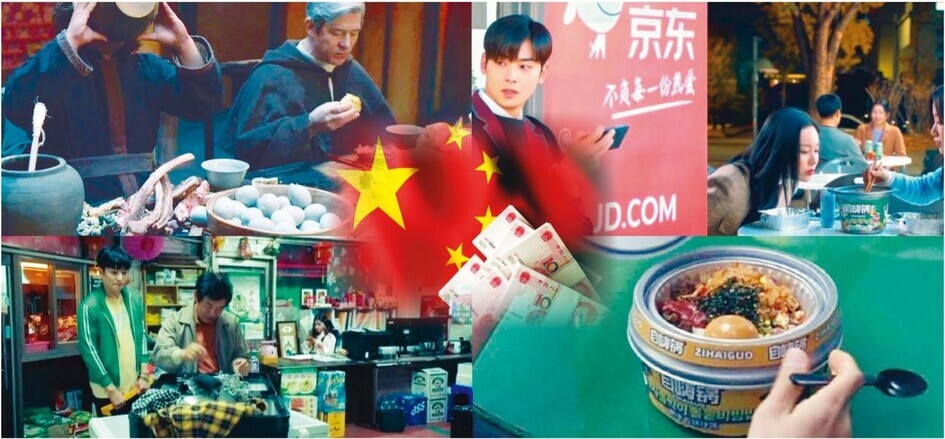
"From the moment they begin creating something based on history, artists are obligated to respect actual historical figures and bear in mind that historical facts are not personal possessions but rather a cultural legacy that speaks for the human rights of the masses."
These words appeared on an electronic screen on a truck parked in front of the headquarters of the South Korean cable network JTBC in Seoul on April 1.
The truck had been placed there by protesters who believe that "Snowdrop," a TV series scheduled to play on JTBC in June, "disparages the pro-democracy movement and whitewashes the Agency for National Security Planning (ANSP) and the dictatorial government" and who want the show's story to be corrected.
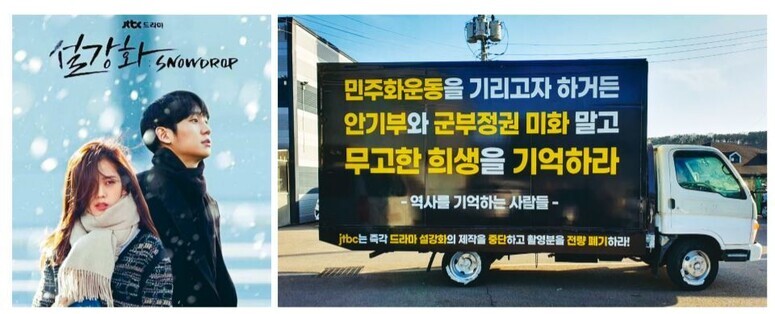
Over 200 people in an online community called "the people who defend history" took part in a fundraising drive.
"I heard that one of the supporting male characters in 'Snowdrop' is a middle manager at the ANSP who is portrayed as an upstanding individual. I got involved because I'm concerned that giving an ANSP manager a positive portrayal and making his actions sympathetic would undermine the spirit of Korean democratization," said a 30-something in the group who goes by Kim Ye-seo (a pseudonym) in a phone call with the Hankyoreh.
"We've seen distortions of incomplete information about a drama that hasn't been aired yet, including the plot summary and character sketches. We've decided to change the name of the female lead, which is currently Eun Yeong-cho, because of its similarity to a democracy activist named Cheon Yeong-cho," JTBC said. But that didn't assuage people's suspicions and anger.
TV viewers' determination to stamp out historically inaccurate TV shows — which historical fantasy "Joseon Exorcist triggered" — is gaining strength. Viewers are looking for distortions not only in series that are already on the air but also series that are still in the works, seeking to nip such errors in the bud.
"Joseon Exorcist" was canceled after just two episodes were televised following an avalanche of complaints by viewers about the use of Chinese-inspired props and scenes in which historical figure King Taejong slaughters commoners and in which Chinese food is served despite the Joseon Dynasty setting.
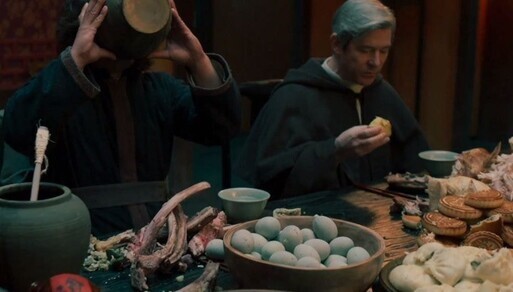
Another series on vigilant viewers' radar screens is "Achimi Balgaol Ttaekkaji" ("Until Morning Comes," English title unconfirmed), which is supposed to air on JTBC in the second half of 2021. The drama is an adaptation of the Chinese novel "The Long Night," which was accused of being propaganda for Xi Jinping's administration at the time of its publication.
The producers explained that they'd "adjusted socialism, communism, and characters that appear in the original work to the situation in Korea" and described the story as being "about one small individual bringing down a powerful organization." But that hasn't stopped viewers from looking askance at the upcoming series.
A user on one online community offered the following thoughts. "The author of this novel is someone who has made nasty comments about democracy protesters in Hong Kong. If they're going to adjust everything to fit the situation in Korea, why even bother using a novel that's been accused of glorifying the government of Xi Jinping?"
The controversy has created anxiety for the producers of other China-related shows. Those include "My Roommate is a Gumiho," the first original Korean program produced by Chinese video streamlining service iQIYI, which is scheduled to air on tvN in May; "Jamjungnok" (English title unconfirmed), which is adapted from a Chinese online novel and also scheduled to be broadcast on tvN; and "Haesiui Sillu" (English title unconfirmed) which presents a love triangle between Korean and Chinese monarchs set during the reign of King Sejong of the Joseon Dynasty.
There's nothing new about controversies over historical distortions — such questions are raised whenever a historical drama or period piece is aired. Those controversies have become more common since the advent and growing popularity of "fusion" historical dramas.
The line between fact and fiction is something that troubles not only the producers of these series but also historians. Even "Deep Rooted Tree," a historical drama aired by SBS in 2011 that was praised for its quality, was accused of misrepresenting the death of Grand Prince Gwangpyeong.
"We researched the period to fit the story to the facts, but we also took liberties to bring out the themes a little better," Kim Yeong-hyeon, the writer of the show, explained at the time.
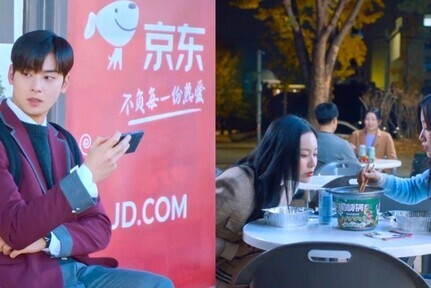
Some shows have changed their story in response to viewers' complaints. "Empress Ki," a 2013 show on MBC, originally depicted Goryeo Dynasty King Chunghye as a decisive and heroic figure overflowing with masculine charm. However, he was a tyrant known for his depraved and wicked behavior. But when the producers were criticized for misrepresenting the king's true identity, they made him a fictional character named Wang Yu instead.
"Empress Ki faced a storm of criticism about historical distortions. Most of the complaints were made by adults posting messages on websites and making phone calls. But now it seems to be the younger generation that's getting fired up," a source who was with MBC at the time told the Hankyoreh over the phone on April 2.
"Anger seems to have boiled over about these examples of Korean history being distorted and Korean culture being appropriated in several dramas at a time when people are already sensitive about history because of scandalous distortions in Japanese history textbooks," said Yun Seok-jin, a professor of Korean literature at Chungnam National University.
Anti-Chinese sentiment also plays a roleAnother factor has been anti-Chinese sentiment whipped up by Chinese nationalists' efforts since last year to appropriate Hanbok (Korea's traditional attire) and kimchi in a Northeast Project campaign. That has played out while an increasing number of Korean TV series have received funhas from Chinese investors and Chinese production companies' assistance over the past few years.
The producers of "Joseon Exorcist" — Studio Flex, Crave Works, and Lotte Culture Works — said that they'd provided all the funding for the now-canceled series. But viewers have focused on the fact that a 5.78% share in YG Entertainment, which is Studio Flex's parent company, is held by a joint venture between the Chinese companies TenCent and Weiying.
"It's only reasonable to suspect that [the series] was made more with the Chinese and Asian markets in mind than Korean viewers," Yun Seok-jin said.
A Chinese sponsor has a product placement contract with the series "True Beauty," which airs on tvN. As part of that contract, show characters eat instant hot pot at a convenience store, while a Chinese-language poster is displayed at a bus stop.
"Vincenzo," also on tvN, faced pushback when lead character Song Joong-ki was shown eating Chinese-style bibimbap.
"It really wounded my pride to see Song Joong-ki eating bibimbap with Chinese writing on the package," one viewer said.
Vincenzo had reportedly sold 200-300 million won (US$177,000-US$266,000) worth of advertisements based on product placement. But when the controversy ignited, the producers canceled the product placement and deleted the problematic scene from video streaming services.
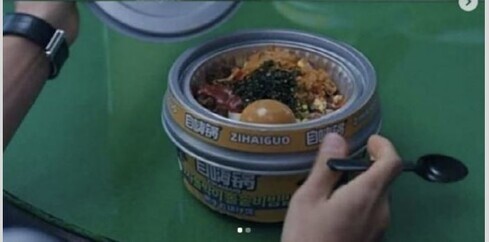
Viewers have also taken issue with Asia Mart, a store selling Chinese products that's a major setting in "Sisyphus: The Myth," aired on JTBC. They tie the location to the fact that JTBC Studio, the producer of the series, received a 100 billion won (US$88.64 million) investment from Chinese company TenCent.
Partly, these viewers are determined not to let Korean pride be sold off to Chinese capitalists. But the complaints reflect another distinctive feature of the younger generation.
That was illustrated by Kim Ye-seo's explanation of why they joined the campaign to rectify historical issues in "Snowdrop."
"If you have a good understanding of history, you can tell apart truth and falsehood. But looking back at my own childhood, I just assumed that all of 'Empress Ki' was true."
"Nowadays, all TV shows can be watched outside of Korea, and the main character of 'Snowdrop' is a member of a K-pop girl group [Jisoo, with Blackpink]. The thought that her fans overseas might be instilled with an incorrect view of history drove me to action."
New generation of media consumers are more conscious about what they watchSome analysts said the case of "Joseon Exorcist" and its cancellation after just two episodes due to issues actively raised by viewers illustrates generational differences from the past.
"Members of the so-called 'MZ' Generation [of people born between the early 1980s and early 2000s], who lead the way in use of social media and see having proactive opinions as a tool for self-expression, have been extremely aggressive about pursuing boycott campaigns on social media whenever a company has been involved in improprieties or other issues," noted pop culture critic Kim Sun-young.
"As part of that trend, people have expressed the view that TV series are also something that should be problematized and actively rejected since they're also a form of commodity," she added.
"Joseon Exorcist" writer Park Gye-ok has expressed that he "did not intentionally distort history," although he did acknowledge having been "complacent during the production process."
In a climate where TV productions have grown ever larger in scale and become more difficult to produce on the networks' budgets alone, creators have viewed Chinese funding as manna from heaven. It's also a reality that Chinese money has helped to drive "K-content" as it becomes an element in the TV production process.
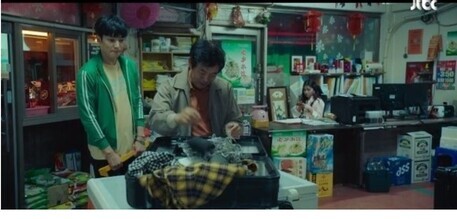
It's a situation that could lead unwittingly to distortions, as the creators feel like they have to tailor content to the investors' tastes. This kind of complacency on the producers' part could lead to people around the world being fed mistaken information — such as claims that the Gwangju democratization movement was spearheaded by North Korean agents.
Experts agreed that with "K-dramas" drawing global attention and viewers becoming more proactive, it's time for the producers themselves to make some changes.
"In many cases, students simply believe history the way it's presented in games and TV series," said Park Myeong-gu, a history teacher at Baeksong High School in Goyang, Gyeonggi Province.
"We need historically themed dramas and films as a way of promoting interest and enjoyment toward history. But when we approach it purely in terms of entertainment, we become susceptible to distorting the facts," he noted. "Historical research is absolutely essential."
Conversely, other observers are fretting that cases of TV series being pulled off of the air due to viewer pressure could have a chilling effect on creative activity and remove production opportunities, leading to a decline in historically based work. Indeed, the recent developments have reportedly prompted discussions toward potentially halting production of at least one series that has been in the works with a contemporary history theme.
"By their nature, Korean broadcasters and companies are fearful of getting caught up in anything, so there's going to be a very strong sense of 'We're better off not making that sort of thing so that we don't get roped in,'" said the producer for one drama series.
"Healthy criticism is a good thing, but it's not good when you're stopping work from being made at all by cutting off the investment," the producer added.
By Nam Ji-eun, staff reporter
Please direct comments or questions to [english@hani.co.kr]

Editorial・opinion
![[Column] Season 2 of special prosecutor probe may be coming to Korea soon [Column] Season 2 of special prosecutor probe may be coming to Korea soon](https://flexible.img.hani.co.kr/flexible/normal/500/300/imgdb/original/2024/0426/3317141030699447.jpg) [Column] Season 2 of special prosecutor probe may be coming to Korea soon
[Column] Season 2 of special prosecutor probe may be coming to Korea soon![[Column] Park Geun-hye déjà vu in Yoon Suk-yeol [Column] Park Geun-hye déjà vu in Yoon Suk-yeol](https://flexible.img.hani.co.kr/flexible/normal/500/300/imgdb/original/2024/0424/651713945113788.jpg) [Column] Park Geun-hye déjà vu in Yoon Suk-yeol
[Column] Park Geun-hye déjà vu in Yoon Suk-yeol- [Editorial] New weight of N. Korea’s nuclear threats makes dialogue all the more urgent
- [Guest essay] The real reason Korea’s new right wants to dub Rhee a founding father
- [Column] ‘Choson’: Is it time we start referring to N. Korea in its own terms?
- [Editorial] Japan’s rewriting of history with Korea has gone too far
- [Column] The president’s questionable capacity for dialogue
- [Column] Are chaebol firms just pizza pies for families to divvy up as they please?
- [Column] Has Korea, too, crossed the Rubicon on China?
- [Correspondent’s column] In Japan’s alliance with US, echoes of its past alliances with UK
Most viewed articles
- 1No good, very bad game for Korea puts it out of Olympics for first time since 1988
- 2Division commander ordered troops to enter raging flood waters before Marine died, survivor says
- 3Korea’s 1.3% growth in Q1 signals ‘textbook’ return to growth, says government
- 4Will NewJeans end up collateral damage in internal feud at K-pop juggernaut Hybe?
- 5[Column] Season 2 of special prosecutor probe may be coming to Korea soon
- 6[Editorial] Korea’s surprise Q1 growth requires objective assessment, not blind fanfare
- 7[Column] ‘Choson’: Is it time we start referring to N. Korea in its own terms?
- 8‘We must say no’: Seoul defense chief on Korean, USFK involvement in hypothetical Taiwan crisis
- 9Korea sees more deaths than births for 52nd consecutive month in February
- 10Is N. Korea threatening to test nukes in response to possible new US-led sanctions body?